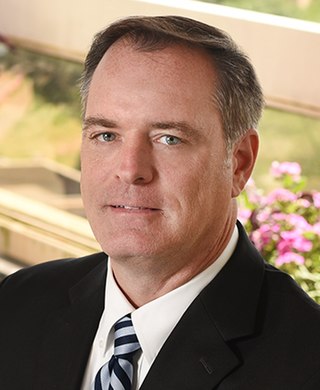
Polytetrafluoroethylene (PTFE) is a synthetic fluoropolymer of tetrafluoroethylene, and has numerous applications because it is chemically inert. The commonly known brand name of PTFE-based composition is Teflon by Chemours, a spin-off from DuPont, which originally discovered the compound in 1938.

Perfluorooctanoic acid is a perfluorinated carboxylic acid produced and used worldwide as an industrial surfactant in chemical processes and as a material feedstock. PFOA is considered a surfactant, or fluorosurfactant, due to its chemical structure, which consists of a perfluorinated, n-heptyl "tail group" and a carboxylate "head group". The head group can be described as hydrophilic while the fluorocarbon tail is both hydrophobic and lipophobic.

Perfluorooctanesulfonic acid (PFOS) is a chemical compound having an eight-carbon fluorocarbon chain and a sulfonic acid functional group and thus a perfluorosulfonic acid. It is an anthropogenic (man-made) fluorosurfactant, now regarded as a global pollutant. PFOS was the key ingredient in Scotchgard, a fabric protector made by 3M, and related stain repellents. The acronym "PFOS" refers to the parent sulfonic acid and to various salts of perfluorooctanesulfonate. These are all colorless or white, water-soluble solids. Although of low acute toxicity, PFOS has attracted much attention for its pervasiveness and environmental impact. It was added to Annex B of the Stockholm Convention on Persistent Organic Pollutants in May 2009.

Microwave popcorn is a convenience food consisting of unpopped popcorn in an enhanced, sealed paper bag intended to be heated in a microwave oven. In addition to the dried corn, the bags typically contain cooking oil with sufficient saturated fat to solidify at room temperature, one or more seasonings, and natural or artificial flavorings or both.

3M Company is an American multinational conglomerate operating in the fields of industry, worker safety, healthcare, and consumer goods. The company produces over 60,000 products under several brands, including adhesives, abrasives, laminates, passive fire protection, personal protective equipment, window films, paint protection films, dental and orthodontic products, electrical and electronic connecting and insulating materials, medical products, car-care products, electronic circuits, healthcare software, and optical films. It is based in Maplewood, a suburb of Saint Paul, Minnesota.

Uma Chowdhry is an American chemist whose career has been spent in research and management positions with E. I. du Pont de Nemours and Company. She has specialized in the science of ceramic materials, including catalysts, proton conductors, superconductors and ceramic packaging for microelectronics.

A non-stick surface is engineered to reduce the ability of other materials to stick to it. Non-stick cookware is a common application, where the non-stick coating allows food to brown without sticking to the pan. Non-stick is often used to refer to surfaces coated with polytetrafluoroethylene (PTFE), a well-known brand of which is Teflon. In the twenty-first century, other coatings have been marketed as non-stick, such as anodized aluminium, silica, enameled cast iron, and seasoned cookware.
The Weinberg Group is a Washington, DC-based food and drug regulatory consulting group. Founded in 1983, the firm assists pharmaceutical and biotech companies with the "development and implementation of successful and innovative regulatory strategies" and also helps these companies to "remediate, maintain and improve their regulatory compliance." The Weinberg Group sent a memo to DuPont in 2003 recommending that the company “reshape the debate by identifying the likely known health benefits of PFOA exposure.”
Per- and polyfluoroalkyl substances are a group of synthetic organofluorine chemical compounds that have multiple fluorine atoms attached to an alkyl chain. The PubChem database lists more than 6 million unique compounds in this group. PFASs started being used in the mid-20th century to make fluoropolymer coatings and products that resist heat, oil, stains, grease, and water. They are used in a variety of products including waterproof clothing, furniture, adhesives, food packaging, heat-resistant non-stick cooking surfaces, and the insulation of electrical wire. They have played a key economic role for companies such as DuPont, 3M, and W. L. Gore & Associates that use them to produce widely known materials such as Teflon or Gore-Tex.
Fluorotelomers are fluorocarbon-based oligomers, or telomers, synthesized by telomerization. Some fluorotelomers and fluorotelomer-based compounds are a source of environmentally persistent perfluorinated carboxylic acids such as PFOA and PFNA, while others are under extended investigation.
The Chemours Company is an American chemical company that was founded in July 2015 as a spin-off from DuPont. It has its corporate headquarters in Wilmington, Delaware, United States. Chemours is the manufacturer of Teflon, the brand name of polytetrafluoroethylene (PTFE), known for its anti-stick properties. It also produces titanium dioxide and refrigerant gases.
DuPont de Nemours, Inc., commonly shortened to DuPont, is an American multinational chemical company first formed in 1802 by French-American chemist and industrialist Éleuthère Irénée du Pont de Nemours. The company played a major role in the development of Delaware and first arose as a major supplier of gunpowder. DuPont developed many polymers such as Vespel, neoprene, nylon, Corian, Teflon, Mylar, Kapton, Kevlar, Zemdrain, M5 fiber, Nomex, Tyvek, Sorona, Corfam and Lycra in the 20th century, and its scientists developed many chemicals, most notably Freon (chlorofluorocarbons), for the refrigerant industry. It also developed synthetic pigments and paints including ChromaFlair.

Water contamination in Lawrence and Morgan Counties, Alabama, revolves around the presence of perfluorooctanoic acid (PFOA) and perfluorooctanesulfonic acid (PFOS) in the water supply. After the US Environmental Protection Agency (EPA) released new health advisories in March 2016, there was concern over health risks of the levels of PFOA and PFOS present. The responses of different government officials, agencies, and companies raise questions as to whether or not there was any environmental injustice involved.
GenX is a Chemours trademark name for a synthetic, short-chain organofluorine chemical compound, the ammonium salt of hexafluoropropylene oxide dimer acid (HFPO-DA). It can also be used more informally to refer to the group of related fluorochemicals that are used to produce GenX. DuPont began the commercial development of GenX in 2009 as a replacement for perfluorooctanoic acid.

Dark Waters is a 2019 American legal thriller film directed by Todd Haynes and written by Mario Correa and Matthew Michael Carnahan. The story dramatizes Robert Bilott's case against the chemical manufacturing corporation DuPont after they contaminated a town with unregulated chemicals. It stars Mark Ruffalo as Bilott, along with Anne Hathaway, Tim Robbins, Bill Camp, Victor Garber, Mare Winningham, William Jackson Harper, and Bill Pullman.
Stephanie Soechtig is an American director and filmmaker who is known for documentaries such as Tapped (2009), Fed Up (2014), Under the Gun (2016) and The Devil We Know (2018).
This timeline of events related to per- and polyfluoroalkyl substances (PFASs) includes events related to the discovery, development, manufacture, marketing, uses, concerns, litigation, regulation, and legislation, involving the human-made PFASs. The timeline focuses on some perfluorinated compounds, particularly perfluorooctanoic acid (PFOA) and perfluorooctanesulfonic acid (PFOS) and on the companies that manufactured and marketed them, mainly DuPont and 3M. An example of PFAS is the fluorinated polymer polytetrafluoroethylene (PTFE), which has been produced and marketed by DuPont under its trademark Teflon. GenX chemicals and perfluorobutanesulfonic acid (PFBS) are organofluorine chemicals used as a replacement for PFOA and PFOS.

Robert Bilott is an American environmental attorney from Cincinnati, Ohio. Bilott is known for the lawsuits against DuPont on behalf of plaintiffs injured by waste dumped in rural communities in West Virginia. Bilott has spent more than twenty years litigating hazardous dumping of the chemicals perfluorooctanoic acid (PFOA) and perfluorooctanesulfonic acid (PFOS).
Despite the best efforts of the government, health, and environmental agencies, improper use of hazardous chemicals is pervasive in commercial products, and can yield devastating effects, from people developing brittle bones and severe congenital defects, to strips of wildlife laying dead by poisoned rivers.

Washington Works, officially named Chemours Washington Works and previously DuPont Washington Works is a plastics factory in West Virginia, United States.











